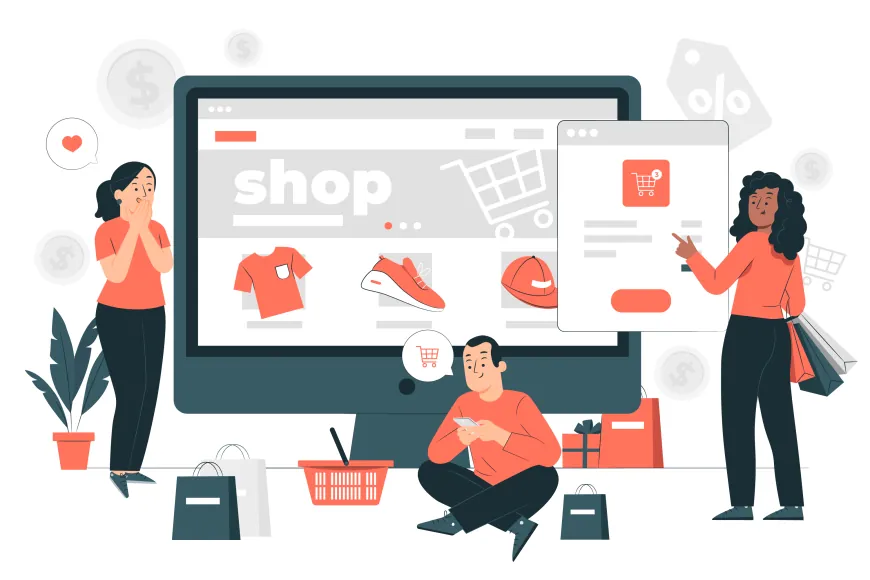Essential Features for E-Commerce Business Success
Discover essential features for e-commerce success in 2024. Learn how 24/7 accessibility, global reach, personalized experiences, and secure payment options drive growth in B2B and B2C markets. Maximize customer engagement and elevate your online business
Understanding E-Commerce
E-commerce, or electronic commerce, involves the buying and selling of goods and services online, using the internet as a primary platform for transactions and customer engagement. By leveraging digital platforms, websites, and mobile apps, businesses can reach broader audiences, streamline operations, and expand their reach effectively in the online marketplace.
Selecting tools that support website management and integrating features that align with business objectives are essential to exploring new market opportunities and optimizing the e-commerce experience. E-commerce not only boosts productivity but also helps reduce costs, build customer trust, and ultimately drive sales and revenue.
But what are the must-have features for successful e-commerce in today's highly competitive market? Below, we explore the key attributes of e-commerce that contribute to business growth and innovation in the digital landscape.
Top Features of E-Commerce
-
Accessibility Anytime, Anywhere E-commerce platforms are accessible 24/7 from any location with internet connectivity. This ubiquitous access empowers customers to browse and purchase regardless of physical limitations, removing barriers and maximizing reach. As a result, businesses can operate without the overheads of physical presence, and customers enjoy the flexibility to shop from anywhere, anytime.
-
Round-the-Clock Availability E-commerce eliminates time constraints, allowing customers to engage and make purchases at any time of the day. Unlike traditional stores, online platforms remain open around the clock, making it easy for consumers to shop when it suits them, regardless of time zones or store hours.
-
Global Customer Reach Digital platforms allow even small or local businesses to reach customers worldwide. With an effective e-commerce setup, a small-town merchant can access a global market, creating opportunities for brand expansion, increased sales, and diversified market reach.
-
Enhanced Product Information and Rich Content E-commerce platforms provide detailed product information—size, materials, colors, reviews, and multimedia content—to give customers a clear understanding of what they’re purchasing. This transparency not only builds trust but also reduces the information costs associated with customer inquiries, fostering a more informed buying process.
-
Personalized Shopping Experience Personalization is a powerful tool in e-commerce. By leveraging data on user preferences, past purchases, and browsing behaviors, e-commerce platforms can tailor recommendations, offer personalized discounts, and communicate with customers in a way that resonates with their unique preferences.
-
Multiple Payment Options Offering diverse payment methods—such as credit cards, digital wallets, bank transfers, and “buy now, pay later” options—makes the checkout process smooth and convenient. Flexibility in payment encourages more customers to complete purchases, thus reducing cart abandonment and boosting conversions.
-
Intuitive Design and User Navigation A user-friendly interface with simple navigation is essential to a positive shopping experience. An organized layout, search functionality, and clear category listings help customers easily locate desired products. Ensuring a smooth and accessible browsing experience can significantly increase customer engagement and retention.
B2B E-Commerce Features
B2B (Business-to-Business) e-commerce caters to transactions between businesses, focusing on managing high-volume orders, bulk purchasing, and customized solutions for different organizational needs. Key features include:
-
Corporate Account Customization In B2B transactions, different users within a business may have specific roles and permissions. Corporate account management allows businesses to set up multiple user roles, manage purchasing rights, and customize account structures, ensuring smooth operational workflows.
-
Flexible Payment Choices Offering a variety of payment options, such as invoicing, credit lines, and third-party payment integration, allows B2B customers to choose a payment method that suits their business model. Flexibility in payments is crucial to building long-term business relationships and driving repeat purchases.
-
Efficient Order Management B2B transactions often involve complex, large-scale orders that require a streamlined order management system. Features like bulk ordering, recurring orders, and multi-channel support make it easy for businesses to manage orders efficiently and improve the overall customer experience.
-
Detailed Product Information Management A comprehensive Content Management System (CMS) is crucial in B2B settings, where detailed product information, manuals, certifications, and quality images help clients make informed purchasing decisions. Sharing this information across platforms such as Google Shopping or Amazon Marketplace can further enhance reach.
-
Request for Quotation (RFQ) B2B pricing often varies based on order volume, customization, or delivery terms. An RFQ feature lets customers request personalized quotes, making it easier to negotiate bulk pricing and secure orders that meet their specific needs.
-
Real-Time Inventory Tracking Real-time inventory updates provide accurate information on product availability, preventing order issues due to stockouts. This transparency strengthens customer trust and supports smooth inventory management for both buyers and sellers.
B2C E-Commerce Features
B2C (Business-to-Consumer) models facilitate direct sales from businesses to individual customers, focusing on easy navigation, responsive design, and seamless checkout processes to enhance customer satisfaction.
-
Responsive Design and Easy Navigation A responsive website design that functions seamlessly on mobile devices, tablets, and desktops is critical in B2C. Easy-to-navigate layouts, intuitive search features, and clear product categories create a hassle-free shopping experience.
-
Customer Reviews and Ratings User feedback and product ratings provide social proof, helping new customers make informed decisions and boosting confidence in the quality of products.
-
Streamlined Checkout Process A simplified, quick checkout process minimizes cart abandonment and encourages customers to complete their transactions. Offering multiple payment methods and a user-friendly checkout enhances the purchasing experience.
-
Secure Payment Options Prioritizing data security is essential in e-commerce. Secure payment gateways and encrypted transactions reassure customers, building trust in the platform.
-
Detailed Product Management Providing comprehensive product information—such as specifications, pricing, and high-quality images—helps customers make informed choices, increasing the likelihood of purchase and reducing return rates.
Conclusion
The success of an e-commerce business relies on a blend of features that cater to customer needs and enhance the online shopping experience. Incorporating these features helps businesses build trust, improve customer engagement, and drive revenue growth. By understanding the unique requirements of each e-commerce model, businesses can create an efficient digital storefront that stands out in today’s competitive market.
What's Your Reaction?
 Like
0
Like
0
 Dislike
0
Dislike
0
 Love
0
Love
0
 Funny
0
Funny
0
 Angry
0
Angry
0
 Sad
0
Sad
0
 Wow
0
Wow
0





















































